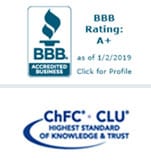
When you pick up, the person—or, more likely, the recording—tells you they’re calling on behalf of Medicare, the Social Security Administration, or even your insurance company.
They say they need your social security number, Medicare number, or bank account information to activate your new Medicare card, sell you a neck brace, or help you claim a cash reward.
They’re lying.
For the more than 59 million Americans currently receiving Medicare benefits, October 15th through December 7th is open enrollment, an opportunity to change your Medicare Advantage or Part D plan. Unfortunately, for Medicare scammers and identity thieves, open enrollment is also open season. Here are four tips that can help you avoid falling victim to common Medicare scams.
1. Government agencies like Medicare and the IRS will never call you
If a government agency or insurance company needs to verify information, especially sensitive information like a social security or Medicare number, they will send you a letter. Unsolicited phone calls are not on Uncle Sam’s to-do list. The only time you will ever receive a call from the Social Security Administration, IRS, or Medicare is if you have already established contact and given them permission to call you back. And if Medicare really is returning your call, they already have your Medicare number and other personal information on file.
2. Your new Medicare card is free and does not require activation
Between April 2018 and April 2019, the U.S. government will be issuing new Medicare cards to help protect cardholders from identity and benefits theft. The new cards contain a unique 11-character Medicare ID rather than a Social Security Number. If that’s news to you, you’re not alone—according to an AARP survey conducted in April 2018, 75% of Americans over the age of 65 knew little or nothing about the Medicare card initiative.
However, while the new cards were intended to prevent fraud, scammers are already taking advantage of the confusion surrounding their distribution. Common scams involve fraudsters impersonating a Medicare representative and trying to extract an “activation fee” for the new cards or offering reimbursement for transactions on the old card—as long as you give them your bank account information first.
3. Licensed Medicare Agents don’t cold call
Or leave flyers on your car. Or offer promotional items worth more than $15. Like the Center for Medicare Services, the only time a real Medicare Agent will call you is if you already have an established relationship.
4. Medicare and your insurance company will never try to sell you medical products or services
Are you in pain? Do you need a brace for your neck, back, or knees? You’ll definitely want one for your wallet after this popular phone scam uses your Medicare number to charge several thousand dollars for medical supplies you’ll never see and may not even need. The only person who should be recommending medical products and billing your insurance for them is your doctor.
If someone calls you and requests your Medicare number or other personal information on behalf of Medicare, hang up and call the Center for Medicare and Medicaid Services at 1-800-MEDICARE.
If you think you might be the victim of identity theft or Medicare fraud, contact the Federal Trade Commission.


Sara McKinney
saractag@gmail.com
Sara is a recent graduate of Kalamazoo College and a new addition to the Cowen Team. Her responsibilities include IT support, event planning, and general administrative assistance.




